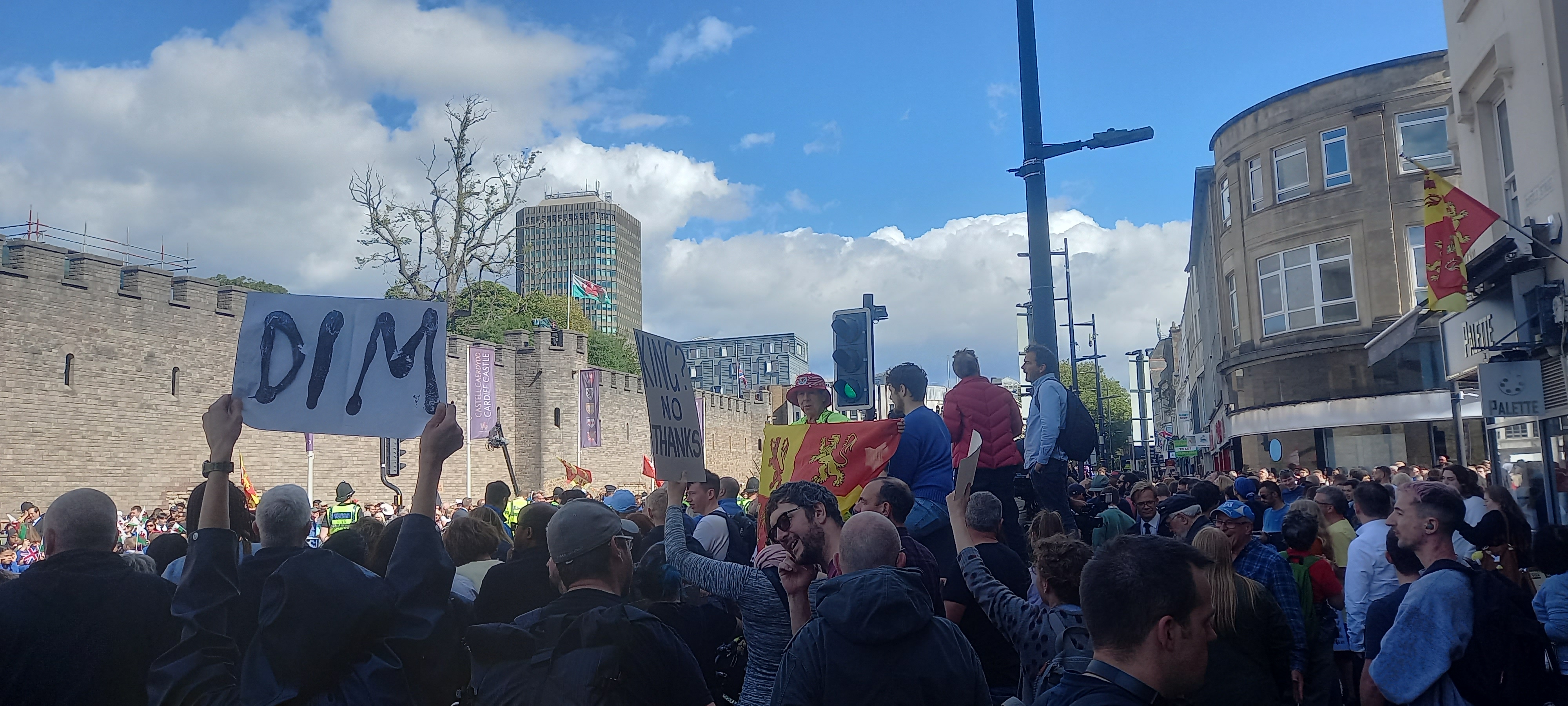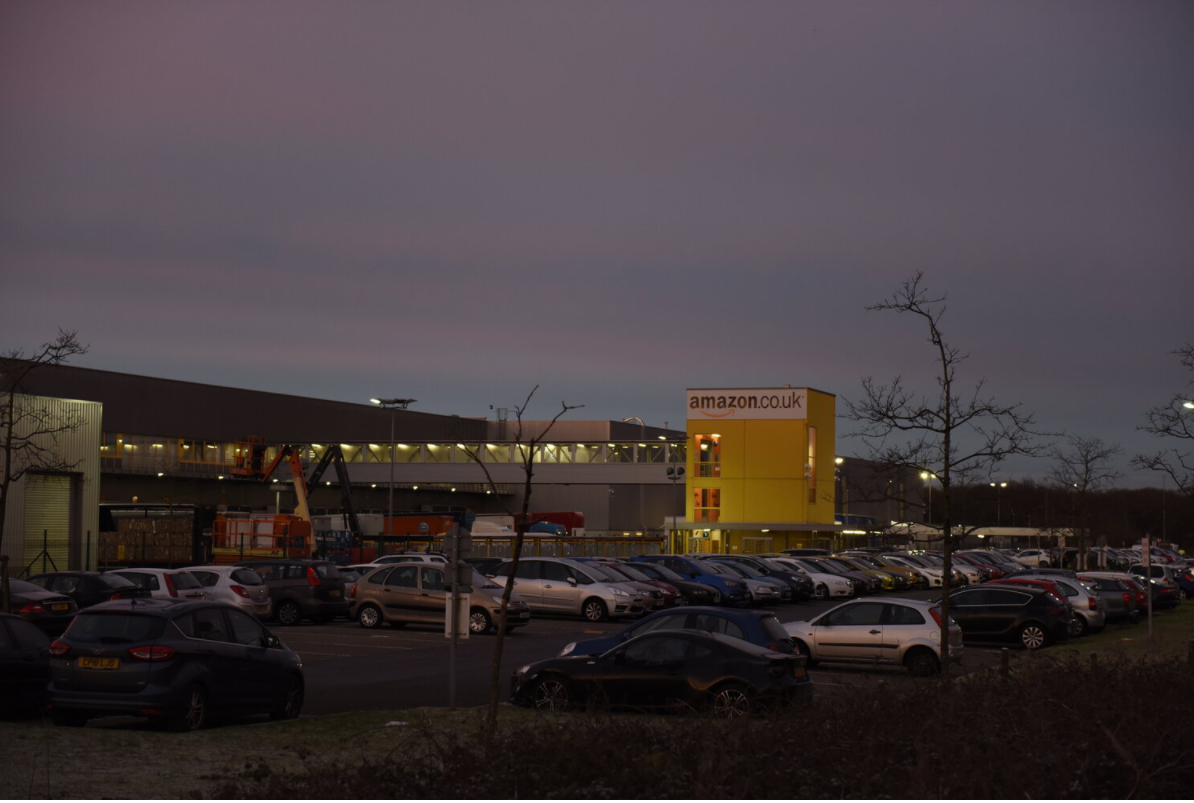
“Nid Fy Brenin, Not My King!” – Cardiff Protesters Give New Monarch Hostile Reception
By Ben Jones. Image copyright Ben Jones
On Friday 16th September, the Welsh capital saw the arrival of the recently appointed King Charles III, following the death of his mother Queen Elizabeth II. Charles, 73, was in the city as part of a tour that also saw him go to Edinburgh and Belfast.
Arriving in the city via helicopter for an all-expenses trip paid for with public money, Charles’ third and final destination was Cardiff Castle, where he was to meet with Welsh Labour First Minister Mark Drakeford.
Some crowds had waited since the early hours of the morning to queue up outside the castle in an event that had drawn international attention – from ABC News in Australia to France’s BFM News. A marked and heavily armed police presence was also notable.
But despite wall-to-wall coverage since Elizabeth’s death, the crowds in Cardiff were smaller than elsewhere and not everyone had come out to welcome the new head of state.
An originally silent – but progressively vocal – protest, organised by Real Democracy Now, met Charles and his entourage with signs and placards denouncing his appointment. A popular phrase – “Nid Fy Brenin!” (Not My King) – could be heard and seen in droves across the crowd.
Former Plaid Cymru Senedd Member Bethan Sayed was one of the organiser of the event and told voice.wales: “We’re living in a democracy, so we should have had a say in how we feel about it. We’re here to ask the question whether Wales wants to have a monarchy and to question if we want to live in a society where someone born into privilege rules over us – I’m a supporter of the Republic of Wales.”
As Charles went to shake hands with the crowd, one man grabbed his attention and said “While we struggle to heat our homes, we have to pay for your parade.”
For the ten day period of official mourning, the enormous price hikes being forced onto ordinary people were largely ignored by the media.
At the protest, traditional Welsh hymns, anthems and celebrations could be heard, along with booing and jeering, resulting in a myriad of clips that have gone viral all across social media. The booing as Charles’ car entered the castle was so loud that it made its way onto national news bulletins.
A petition, started in early September, calling for the end of the Prince of Wales title, has reached over 33,000 signatures.
Speaking to Channel 4 news after the event, one of the protest organisers with Real Democracy Now, Adam Johannes, said the group was hoping for the biggest protest Wales has ever seen on the day of the investiture when Charles’ son, William, is set to be officially crowned as the Prince of Wales.
Some had travelled from all over Wales to protest. One of them, Sarah, said: “I’ve been in the UK for 24 years, I’m a migrant. I’m a citizen, not a subject. No-one is any better than anyone else simply because of where they were born.”
“Until the last couple of weeks I felt indifferent, but once the Queen passed – it’s been a very disrespectful time for Wales, because we weren’t consulted, ” said Miriam Jones, a public sector worker. “We were being told how to feel. There’s another aspect of disrespect to me, because my mother fought for bilingual road signs across the country.”
Friday the 16th also marked Owain Glyndwr Day – a celebration of the life and ascension of the final ‘official’ Prince of Wales who founded Wales’ first recorded parliament and led a rebellion against King Edward. Glyndwr’s eventual defeat led to the Prince of Wales title being held by the son of the English monarch.
Many questioned the timing of the visit, not least the left wing actor Michael Sheen: “..to choose September 16 to come to Wales having only a short time ago proclaimed that he had created his son William as the new Prince of Wales and to choose this this day September 16 to come here as his first visit as King seems full of meaning.”
“…it seems insensitive to the point of insulting,” said Sheen.
Protestors sported Owain Glyndwr’s flag, which symbolises the legendary warrior’s rebellion against the English in yellow and red – while others created signs.
To Miriam, Charles’ visit was yet another instance of disrespect: “They must have known.”
Police had been stationed since 5am to prepare, with some on an overnight shift, from late at night to early in the morning.
Nearby routes were cut off, affecting food delivery drivers forced to take alternative routes, slowing down an already busy lane.
Lynd, a student, had also come out to protest the imposition of a new King and Prince of Wales title: – “I think mainly, it’s about the question of Welsh Independence, and Westminster is part of the campaign against it – the monarchy and government still has the belief that they ‘own’ Wales, and that trickles down.”
Despite all of this, a mixture of Union Jack’s and Welsh flags, and enthusiastic chants of “God Save the King” could also be heard. Two supporters, who did not want to be named, had waited since 5am: “He was next in line. It is his right,” they simply said.
Another, Ian, who was born in Cardiff, was one of many at the event selling flags and novelty items: “I do believe in the monarchy,” he said. “I think it’s good for the country, they bring in a lot of tourism, so they make us a lot of money. I’ve been here since 9am.”
Speaking to after the protest, organiser Adam Johannes told Channel 4 news:
“Wales is the poorest country in the UK and there’s a real sense of marginalisation. We’ve given so much to democracy, the NHS was born here yet we’re still marginalised within this state.”
“[The investiture] represents everything that’s wrong.. Where some people have so much and some people have so little. So I hope we’ll see the biggest demonstrations Wales has ever seen if this investiture takes place.”



1 Comment
Comments are closed.